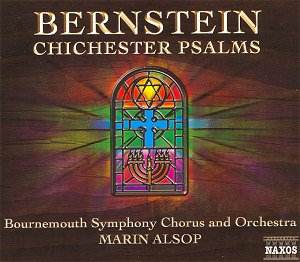The assassination of JFK in November 1963 had
a profound effect on everybody who was alive and old enough to
understand at the time. Nobody was more deeply shocked than the
forty-five-year-old Leonard Bernstein; "the assassination
threw me for a loop. In fact, I don’t think I’ve recovered from
it yet" he wrote some fifteen years later. So deeply was
he shaken that he called a halt to the headlong rush of his career,
and took, to the amazement of all his friends and colleagues,
a "sabbatical year", suspending all engagements during
the 1964-5 season. However, he did break the self-imposed ‘purdah’
on one occasion, to compose one of his most delightful and abiding
works, the Chichester Psalms. It was written at the behest of
the Rev. Walter Hussey, Dean of Chichester Cathedral, though the
premiere was actually given in New York in May 1965.
There have been many fine recordings of the Psalms,
but this Naxos one is worthy to be placed alongside the best of
them. It begins with a rhythmically tight first movement, the
Bournemouth Symphony Chorus responding marvellously to the wild
energy of the 7/4 music. The slow movement that follows, a setting
of the 23rd Psalm, is as ravishing here as I have ever
heard it, with an exceptional contribution from thirteen-year-old
Thomas Kelly in the demanding solo part. Kelly is vocally superior
to John Bogart on Bernstein’s own 1965 recording, and is preferable
even to Aled Jones in Richard Hickox’s 1986 version, partly because
Jones was very much a treble, whereas the part calls for a slightly
darker sound.
The finale is superbly done, with the strings
of the BSO responding richly to Alsop’s impassioned interpretation
of the introduction. The recording has a splendid depth of ambience
here, and when the male voices of the choir enter with that irresistible
tune, their tone is firm yet gentle. The quietly ecstatic mood
is sustained through to the rapt coda, ushered in by Elizabeth
Franklin-Kitchen’s exquisite high G. This is a deeply satisfying
performance of this unassuming work, which has quietly made itself
a staple of the choral repertoire.
The disc begins with an equally fine version
of the symphonic suite put together from Bernstein’s only film
score, that for Sam Spiegl’s ‘On the Waterfront’. Despite its
strong echoes of Stravinsky and Copland, this is vintage Bernstein,
with a particularly memorable ‘love episode’ as its central section.
Alsop paces the music a little more deliberately than the composer
(though I have only his earlier 1960s version to hand), but the
climaxes do gain from this, and, if anything, the piece grows
in stature from the more spacious approach.
The final tracks contain the Three Dance Episodes
from the musical ‘On the Town’. These are given stylish and appropriately
rumbustious performances, the BSO relishing the sprung rhythms
and raunchy melodies. Naxos have produced another winner here;
wonderful playing and singing, and a recording which is crystal
clear and atmospheric at the same time. I have to say that
48:36 is far from generous – but there you go, at under a fiver
who’s complaining?
Gwyn Parry-Jones
